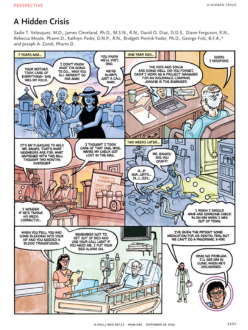LINC Collaboration Yields High-Impact Publication in the New England Journal of Medicine

The LINC Academic Affairs Council finalized their annual workplan in January 2022, which included a priority to develop a university-wide interprofessional education (IPE) simulation for all UT Health San Antonio students to complete near the middle of their respective programs.
An interprofessional team of faculty and staff led by Dr. Sadie Trammell Velásquez, Associate Professor/Clinical and Assistant Dean for Preclinical Curriculum in the Long School of Medicine’s (LSOM) Office of Undergraduate Medical Education (UME), was formed to tackle this challenge. Team members include Drs. Jim Cleveland and Kathryn Parke (School of Nursing), Bridgett Piernik-Yoder (School of Health Professions), David Ojeda Diaz (School of Dentistry), Rebecca Moote (UT Austin College of Pharmacy), and Ms. Diane Ferguson (LSOM).
On September 24, 2022, the first pedagogical tool created by this team for the LINC Simulation IPE Experience, a graphic perspective called “A Hidden Crisis,” was published in the New England Journal of Medicine. The storytelling method, a combination of graphic novel- and comic art-style techniques, builds upon the successful years-long collaboration between LINC Director, Dr. Joseph Zorek, and Chicago-based artist and illustrator George Folz.
The LINC team zeroed in on dementia and caregiving because the combination creates challenges that touch many practicing clinicians. “Patients with dementia are complex and require interprofessional teams to care for them during the early stages of disease and as the disease progresses over time,” said Velásquez. “We chose to focus on the patient’s caregiver in this complex, yet all-too-common scenario, to emphasize the importance of interprofessional teamwork and communication. These skills are critical in caring for both patients with dementia and their caregivers.”
“The publication of our work in NEJM means a couple of things,” according to Dr. Deborah Conway, Professor and Vice Dean for UME and LSOM representative to the LINC Academic Affairs Council. “First, the topics we chose to build our IPE simulation around—caregiver burnout and the complexity of the healthcare system—are highly relevant to the practicing medical community. Second, it is a recognition of the standards for high-quality, authentic, engaging IPE experiences we aim for on our campus. The publication is a stand-alone asset for NEJM’s readership, and we know that the graphic perspective is just one element of an immersive simulated experience where our students will practice important collaborative skills together.”
In preparation for the Spring 2023 university-wide launch of the LINC Simulation IPE Experience, Velásquez and her team completed a pilot in October that included “A Hidden Crisis” as background for a simulated standardized patient encounter. The pilot included 21 students from 9 educational programs on campus. Among pilot participants was Ms. Katherine Loftus, a nursing student, and Mr. Vincent Vento, an occupational therapy student, who serve as the Chair and Vice Chair of the LINC Student Council, respectively.
“Having spent the last two years in nursing school working directly with people who have Alzheimer’s and other forms of dementia, the way this graphic perspective portrayed caregivers’ experiences regarding role overload and sense of defeat felt real to me and motivated me to want to help,” said Ms. Loftus.
Mr. Vento echoed this sentiment, sharing that “the graphic perspective allowed our team to link our own personal and respective practices to a simulated situation that felt very real to life. It added tools to our clinical toolbelt for future experiences and encounters out in the field.”
The LINC Simulation IPE Experience, according to Loftus, will be vital to the educational journeys of all students. “In some way, shape or form,” said Loftus, “we will be working with other professionals collaboratively in the future. Therefore, it benefits us all, including our patients, to form relationships and understand each other’s scopes of practice. I am thrilled to have had the opportunity to participate in this pilot, and I am highly anticipating what is in store for the future of IPE here at UT Health.”
